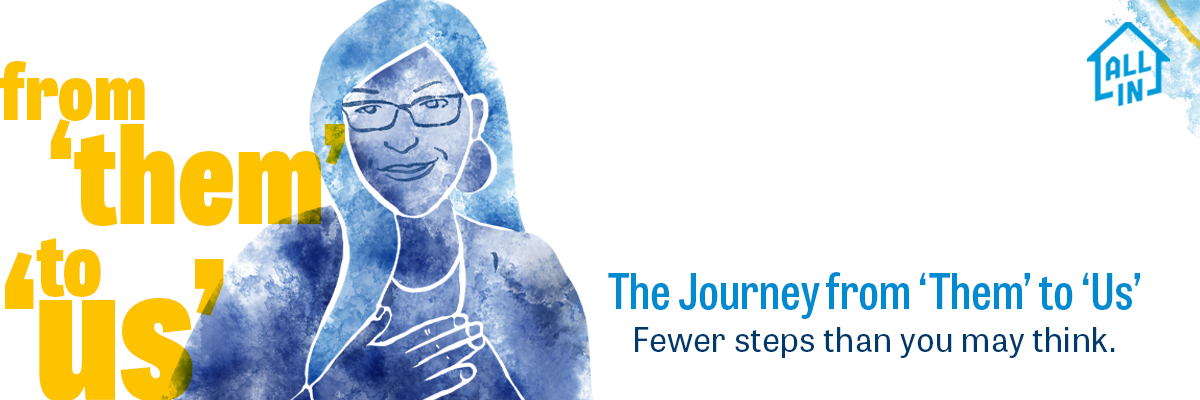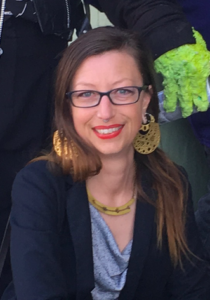The Journey from ‘Them’ to ‘Us’: Fewer Steps Than You Might Think

Through our Community Focus Series, All In is centering the voices of people with lived homeless experience and sharing the knowledge of those working to provide the solutions—homes and services—we need to make homelessness history in San Francisco.
We experience other people’s stories all the time. We feel sad when we read hard stories in the news, but we’re a layer removed because we don’t know the subjects and their circumstances seem so different from ours.
Then one day, life takes a turn and suddenly, we’re not far away at all: We’ve gone from ‘them’ to ‘us.’ We find ourselves part of new communities, united by realities not usually featured on our feeds and cares that have now become personal.
One mother described her own experience of this journey of ‘them’ to ‘us.’ Her happy and healthy daughter began experimenting with opiates. “As a child of the sixties, opiates could only mean one thing and I would have none of it,” she said. “Years of honest communication and mutual respect were compromised by a well-intended but grossly misguided attempt at changing my daughter’s path. I nearly lost her.”
But three years later, she flew out to San Francisco—this time to support her daughter as she navigated the justice system. With the support of the Homeless Youth Alliance, her daughter was getting her life back on track. Without the help of the director, Mary Howe, the mother said, “I believe I would have been on the wrong side of a statistic…Since the staff has all been where my daughter was, they provided inspiration and insight in ways I simply cannot.” Empathy, experience, and compassion pave the road of the journey of ‘them’ to ‘us.’
Meet Mary Howe
Like so many of us, Mary Howe grew up not feeling comfortable or accepted for herself in her home community. So, in her teen years, she left Napa and moved to San Francisco.
“As a result of America’s systems and policies that have focused on criminalizing poverty and drug use,” she recalls, “I became stuck in a cycle of intense involvement with the juvenile justice system.”
Looking back, she finds it hard to explain how she was able to exit a cycle she has seen so many get stuck in for decades. But there were a few significant things that Mary credits with helping her find her feet.
One of the most important of these was that she had a community where she felt belonging and received deep support. A friend helped her find and get a job as an outreach worker in San Francisco.
“I could never have predicted how that action would completely change the trajectory of my life,” Mary says. “I found a passion and a purpose, a fire was lit that 22 years later is still very present in my life.”
Time and again, we’ve heard from experts in solutions to homelessness how important it is that people are housed within their own communities and networks of support, instead of being placed in a location that completely severs those essential ties.
Homeless Youth Alliance
Today, Mary and her team at the Homeless Youth Alliance are paying it forward, helping young people receive the support that Mary had—support that would have saved the lives of many of her friends when she herself was on the street.
“I am passionate about connecting with and supporting individuals who are living without housing and showing them that they have value and that their lives and voices matter. While my heart breaks every single day at the realities I witness, also every single day I am inspired by others’ resilience and better nature.”
Despite the pain she endured in her time living outside, Mary remains grateful for her experience. “I reflect on those years anytime I struggle with this work,” she muses, “It keeps me motivated to stay with people and support them, no matter how hard the moment or the circumstance is.” And the moments and circumstances are hard, as she shared in this blog post after the loss of her friend, Ian.
Mary’s experience has made her deeply effective. But even if we haven’t lived those realities in our own lives, our doors to compassion aren’t closed. As the mother at the beginning of this story said, we don’t want to find ourselves on the wrong side of a statistic. Whatever our current situations, we need to open our eyes to the fact that people living outside could be our child, our parent, our friend—or even ourselves.
“I always say a good place to start is by opening yourself up to learning about the experiences of others,” Mary says. “The next time you are walking down the street and are tempted to avert your eyes from someone who makes you feel uncomfortable, instead acknowledge them. Say hello, share a smile. On a rainy day as you’re leaving your home, grab that jacket you never wear and give it to someone. When you are getting your morning coffee, buy an extra. These gestures may seem small or insignificant, but I assure you, they are not.”
Our challenge to you today is to think outside your current feed. Raise your head and open your heart to the stories and experiences of the people around you—those who live inside and outside. Those little gestures Mary mentioned can bridge distances, and those distances are smaller than you might think.
Mary Howe + HOMELESS YOUTH ALLIANCE
Mary Howe, Executive Director and Founder of the Homeless Youth Alliance, is a formerly homeless youth who has dedicated her career to developing and implementing interventions that empower young people to improve their own lives and those of their peers, and to addressing the structural causes of poverty and homelessness.
Mary assumed leadership of HYA in 2006 when two long standing grassroots programs—Haight Ashbury Youth Outreach Team and San Francisco Needle Exchange—ended their affiliation with Haight Ashbury Free Clinics, Inc. and merged to form a single organization under the name “Homeless Youth Alliance.”
Mary secured fiscal sponsorship for the newly created HYA and spearheaded its consolidation and growth. She brings more than two decades experience in direct service and outreach with marginalized and underserved populations.
Howe provides training to individuals and organizations, both locally and nationally with an emphasis on youth experiencing homelessness, provision of inclusive culturally competent care, medical care of marginalized communities, addressing racism in safe spaces and how to practice inclusion, harm reduction, drug use and NIMBYism.
Howe is published in several Journals and is also currently working on an ethnographic study of opioid use throughout the US.


